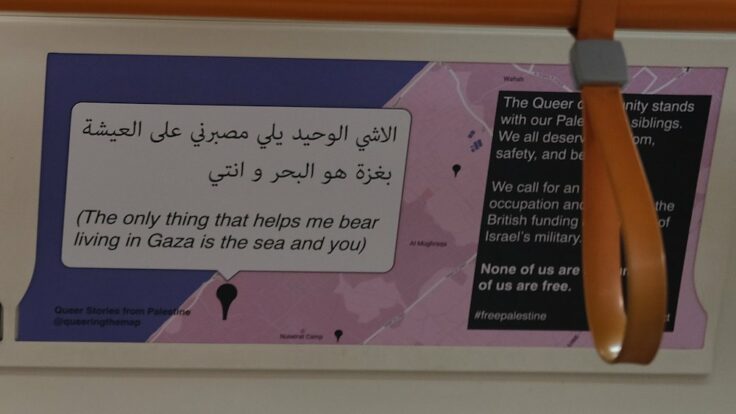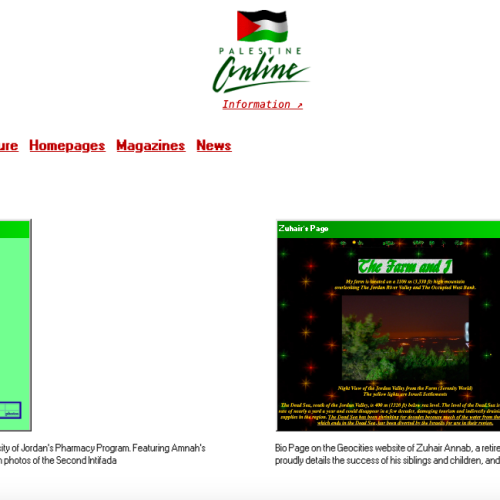When we think of hackers, we often conjure up images of shadowy figures working in the dark corners of the internet, breaching security systems for personal gain or causing chaos. However, there is another side to hacking that often goes overlooked– the world of ethical hackers, or “hacktivists.” A portmanteau of “hacking” and “activists,” these individuals leverage their technical skills to champion social causes and work toward the greater good. Ever since Israel began its bombardment of the Gaza Strip, killing over 8,000 people, mostly women and children, a number of hacktivists from across the globe have decided to use their inimitable digital know-how to champion for the Palestinian cause as the death toll mounts.
Last week, the U.K.’s transit network was taken over by messages from LGBTQ Palestinians in Gaza, pulled from Queering the Map, an online platform that allows LGBTQ people around the world to post anonymous, geotagged messages. The hacked ads were the brainchild of a group called The Dyke Project, “a collection of trans, cis, non-binary lesbians and queers of all persuasions who show that dykes are thriving,” according to their bio on X (formerly Twitter).
Beautiful action from @theDykeProject, which has hacked over 100 ads across TfL bus, rail and tube networks to share queer Palestinian stories, and show queer solidarity with Palestinians. pic.twitter.com/0eRyM5Pi39
— micha frazer-carroll (@micha_frazer) October 27, 2023
“BREAKING: we have HACKED over 100 bus adverts across London’s TfL [Transport for London] network,” the group wrote on X. “We replaced ads with stories from queer Palestinians, and a call for an end to the occupation.”
The ads also included a message from The Dyke Project that read, “The Queer community stands with our Palestinian siblings. We all deserve freedom, safety, and belonging.”
Since Israel began its bombardment of the densely-populated enclave on Oct. 7, a number of hackers have decided to join the fight, targeting dozens of government websites and media outlets, including a Jordanian hacker who interrupted Israel’s Channel 13 broadcast, played Fida’i (the national anthem of Palestine), and captioned it “Palestine is free and will remain free.”
Meanwhile, Anonymous Sudan, a hacker group, revealed that it is behind an attack on the Jerusalem Post, Israel’s most-read English news website. As a result, the online publication was down for a couple of days.
Shoutout northwestern hacker for editing the school paper 😭 this is so dope pic.twitter.com/RMHJnw0bHT
— Riff 🪂 (@Riffs33) October 25, 2023
On Oct. 26, students at Northwestern University in Illinois were met with “fake” copies of the technological institute’s newspaper, Daily Northwestern, which appeared strewn around various locations across the campus. The headline of the false version of the newspaper read, “According to the Palestinian Ministry of Health, Israel has killed 5,087 Palestinians. Including 2,055 children, 1,119 women, and 187 elderly.”
Another headline read, “Northwestern complicit in genocide of Palestinians,” and included fake quotes from university administrators.
The Daily Northwestern said on X that they “are aware of tampering with copies of The Daily’s print edition and are investigating the matter.”
It’s not the first time that people use their computer skills to advocate for the Palestinian cause. Algerian cyber-criminal Hamza Bendelladj gained notoriety as a highly-skilled computer hacker who was able to hack into over 200 banks and steal a whopping $400 million dollars— he donated all of the stolen money to various charities in Palestine.
Though Bendelladj’s actions were illegal, in an age where information and communication technologies play a pivotal role in our daily lives, the realm of hacktivism, as controversial as it may be, has emerged as a powerful tool for social change. Considering the constant mainstream media bias when it comes to reporting about Palestine, combined with Gaza’s communication black out as a result of the siege, hacktivists have proved to be instrumental in giving a voice to the voiceless during this ongoing humanitarian crisis.









